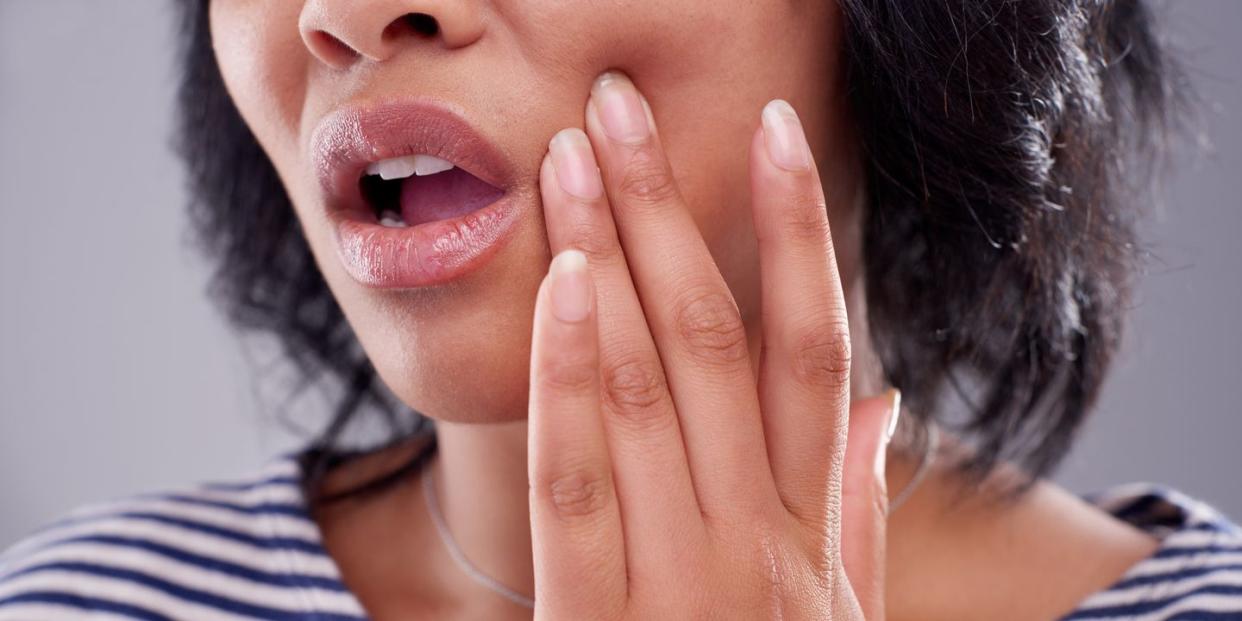Here’s Why Your Jaw Constantly Hurts, According to an Orofacial Pain Specialist

The jaw is one of those body parts that’s easy to take for granted until it hurts—and then it’s all you can think about. When jaw pain makes it difficult to chew, talk, or move due to shock-like sensations, sharp stabs, or a dull ache that just won’t go away, it can be concerning and life-disrupting.
One form of jaw pain to take very seriously is pulsating, hard-to-pinpoint pain in the side of your jaw, which could indicate—of all things—a heart attack. “Similar to the pain that a patient can experience in the left arm during a heart attack, this pain can also move into the lower corner of the jaw below the ear,” explains Isabel Moreno Hay, D.D.S., Ph.D., division chief and program director of the Orofacial Pain Program and assistant professor in the College of Dentistry at the University of Kentucky in Lexington. Because it can be life-threatening, if your jaw pain comes along with other symptoms of a heart attack like dizziness, shortness of breath, cold sweats, or indigestion, seek medical attention immediately.
Otherwise, reasons for jaw pain are often easy to identify. “Toothaches are the most common cause of face pain, followed by temporomandibular disorders,” says Dr. Moreno Hay. Temporomandibular disorders (TMD) cause pain and discomfort in your temporomandibular joints (TMJ), the moving hinges located in front of your ears that connect your jawbone to your skull and allow you to open and close your mouth, chew, and clench your teeth.
While mild jaw pain can sometimes be managed with self-care measures like applying a moist, warm towel or cold compress to the area, if the pain is persistent or you can’t open or close your jaw completely, it’s time to call a doctor or dentist. Be prepared to talk about where you’re having pain, how long you’ve been having it, what seems to trigger it, and any other symptoms you’ve been having in your head, mouth, ears, or neck, says Dr. Moreno Hay. After an exam of your jaw joints, muscles, and mouth, you may need an x-rays, MRI, CT scan, other tests, or a referral to a specialist for a definitive diagnosis.
In the meantime, you can get an idea of what might be going on with your face by perusing these jaw pain causes below, ranging from the most common culprits to rare but possible explanations.
1. Something’s wrong with your teeth.
Many common dental problems like cavities, an infected tooth, or gum disease can cause pain in your teeth, gums, or jaw, says Dr. Moreno Hay. If you’re experiencing throbbing tooth or gum pain that’s worse with exposure to cold or hot foods or drinks, the sooner you can see a dentist the better, as many of these issues tend to get harder (and more expensive) to treat over time.
After a dental exam, you may need x-rays as well as advanced teeth cleaning, antibiotics, prescription mouthwashes or gels, a root canal, or surgery to get relief from a toothache or gum condition. From then on, oral hygiene practices like regular brushing, flossing, and dental visits can help keep jaw pain at bay.
2. You have a TMJ disorder.
TMJ disorders may affect about 5 to 12% of people around the world, and women are twice as likely to suffer from them compared to men. Interestingly, unlike many other chronic pain conditions, TMJ disorders are more common in younger people, per the National Institute of Dental and Craniofacial Research (NIDCR).
If you’re dealing with a TMJ disorder, something is off either with the joints or muscles that move your jaw. You might experience pain in front of your ear when you chew, talk, or move your jaw as well as clicking or popping noises, earaches, headaches in your temples, or difficulty moving your jaw whatsoever, says Dr. Moreno Hay.
TMJ disorders can arise for a slew of different reasons including recent injury, overuse (say, due to chewing gum), arthritis, teeth grinding, or misalignment of your jaw. If you’ve been particularly stressed out lately, that can make symptoms of TMJ worse, too. A chat about your health history as well as a physical exam and x-rays can help a doctor or dentist diagnose you with a TMJ disorder.
You can often ease TMJ pain with conservative treatments like eating soft foods, applying hot and cold compresses, learning how to avoid triggers like clenching your teeth, and taking anti-inflammatory and pain medications as directed by your doctor, says Dr. Moreno Hay. Because more research is needed on the safety and effectiveness of more aggressive treatment options like surgery, splints, and dental adjustments, it’s important to meet with an orofacial pain specialist in order to figure out the best treatment plan for you.
3. You’re stressed to the max.
“It is not uncommon for people who are under stress to naturally respond by clenching their teeth,” says Dr. Moreno Hay. Been there? Teeth grinding and clenching (a.k.a. bruxism) at night and during the day can make your jaw muscles feel tender and sore. In more severe cases, you might also have pain from damage to your chompers.
Often, you can relieve jaw pain from grinding your teeth by wearing a mouthguard at night, checking in with yourself to stop clenching throughout the day, and practicing relaxation techniques like meditation or breathing exercises before bed. But if you’re experiencing significant pain or additional symptoms, your dentist might need to repair damaged teeth or recommend a visit to a therapist or sleep specialist to treat potential underlying causes, like an anxiety disorder or a sleep disorder such as sleep apnea.
4. Your sinuses are acting up.
If you’re prone to sinus infections or sinusitis, you know the biggest sign is that you can’t breathe through your nose, but jaw pain could also be an unexpected symptom. When your sinuses (the hollow arrears in your skull and face bones) swell up, they can cause pressure and pain in your cheekbone, upper jaw, or upper molars, and headaches that are aggravated when you move your head around, says Dr. Moreno Hay.
The best cure tends to be time. If it’s been over a week and a half and self-care measures like drinking lots of fluids, breathing in steam, and taking OTC pain relievers like acetaminophen (Tylenol) and ibuprofen (Advil) aren’t cutting it or you’ve had a fever for a few days, contact a doctor. Usually, antibiotics aren’t necessary. However, you may need a referral to an ear, nose, and throat specialist (ENT) to treat underlying issues such as allergies or nasal polyps (non-cancerous growths).
5. Arthritis might be wearing away at your joints.
Notice an eerie crunching or grinding sound when you move your jaw? “Arthritis can affect any joint of the body including the TMJ,” says Dr. Moreno Hay. “The reason why an arthritic joint may make a grating noise is because the joint surfaces wear down and during movement there’s an increase in friction between bones.” You might also experience other symptoms of arthritis like stiffness, swelling, and pain in front of your ear or earaches.

Osteoarthritis causes cartilage, the flexible tissue that allows joints to move smoothly, to break down over time and typically strikes the hands, knees, hips, and spine first. While it’s more common in older people, jaw injuries or infections could speed up the process. It’s diagnosed with an exam and sometimes x-rays or MRIs. Treatment involves non-steroidal anti-inflammatory drugs (NSAIDs), home remedies, the use of a mouthguard, limiting jaw movement, and if you’re still in need of relief, surgery.
Rheumatoid arthritis (RA), a chronic inflammatory disorder that causes your body to attack itself, can lead to painful swelling in the lining of your joints throughout the body—including your jaw. Usually, the pain begins in your fingers and toes and may be worse in the morning or when you haven’t moved around in a while. A physical exam, blood tests, and imaging can help your doctor identify the disease. You can manage your symptoms with a combination of medication, physical therapy, lifestyle changes, and, in some cases, surgery.
6. Or you could have a nerve condition.
One of the scariest forms of jaw pain, trigeminal neuralgia (TN), a.k.a. tic douloureux, can trigger debilitating attacks of extreme, burning, or electric shock-like pain typically on one side of the jaw or lower face that can last anywhere from a few seconds to two minutes, per the National Institute of Neurological Disorders and Stroke (NINDS). You might also experience an aching or stabbing pain that’s not as intense but almost constant. Even ordinary movements—like putting on makeup, shaving, or brushing your teeth—could bring on intense pain and headaches which can worsen over time. Women and people over the age of 50 are more likely to be affected by this condition.
7. You have a severe headache.
Cluster headaches are a brutal type of headache typically felt behind the eyes and associated with a slew of other symptoms like tearing, redness of the face, congestion, and—for some people—face and jaw pain as well, says Dr. Moreno Hay. They’re relatively rare compared to other types of headaches and tend to strike in cycles lasting anywhere from weeks to months followed by periods of remission. Migraine headaches can also sometimes come with jaw pain along with throbbing pain on one side of the head, a stiff neck, nausea, and extreme sensitivity to sound and light. They tend to arise due to triggers like hormonal changes, bright lights, weather changes, and increased stress.
In both cases, an exam and imaging tests can help your doctor come up with a diagnosis. Jaw pain should fade with headache treatment, which typically involves medication and lifestyle changes, like sticking with a sleep schedule and routine, tracking headaches, and avoiding triggers.
8. It’s rare, but you may have a bone infection.
If you’ve recently had dental surgery, hurt your mouth, or have a condition that affects your immune health like diabetes or kidney failure, you could be at increased risk of a serious bone infection called osteomyelitis. Warning signs that call for immediate medical attention include pain in your actual jaw bone, redness, swelling and warmth in the area, and a fever. If you suspect you could have osteomyelitis, seek help ASAP as the infection could cut off your blood supply and cause permanent damage including the loss of your jaw bone if left untreated. Speedy treatment with IV antibiotics can help prevent serious complications and surgery can remove the affected part of the bone, says Dr. Moreno Hay.
9. A growth may be putting pressure on your jaw.
Another rarity: A tumor or cyst growing in your jawbone, mouth, or face could cause pain and swelling in your jaw. “These can be asymptomatic or present a wide range of symptoms depending on the affected structures,” says Dr. Moreno Hay. While jaw tumors and cysts are typically benign or noncancerous, they can sometimes grow quickly, invading your jawbone and displacing teeth.
If you suspect you might have a growth in your jaw, your doctor can determine a proper diagnosis with imaging tests and a biopsy. After that, a combination of therapies and surgery can be used to remove the growth and help your jaw heal. Follow-up appointments to check for recurrences might be necessary, too.
Go here to join Prevention Premium (our best value, all-access plan), subscribe to the magazine, or get digital-only access.
FOLLOW PREVENTION ON INSTAGRAM
You Might Also Like

